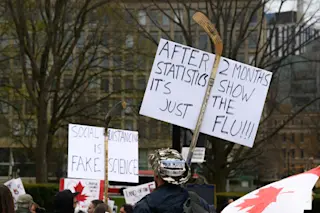Since COVID-19 lockdowns descended, people’s longings for haircuts, child care and adult interaction have steadily grown. But there’s one thing for which our appetite seems even more insatiable: conspiracy theories.
The latest example making the rounds is the already-debunked Plandemic video, which argues that shadowy forces manipulated the virus to control people. Despite its out-there premise, the video has had serious uptake: It racked up more than a million views before YouTube removed it. Other discredited COVID theories have amassed their own cult followings.
It can feel baffling to watch friends and family passing on such theories like gospel. But to behavioral scientists, it isn’t really all that surprising — especially in the midst of a pandemic.
“There’s good evidence that conspiracy theories flourish during times of crisis,” says Joseph Pierre, psychiatrist and researcher at the David Geffen School of Medicine at UCLA. “When we feel insecure, we often look ...














